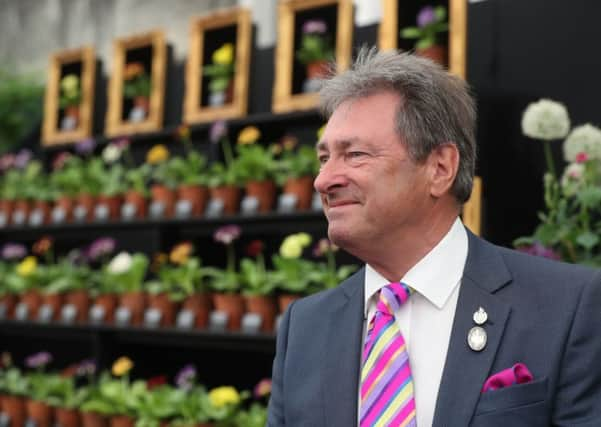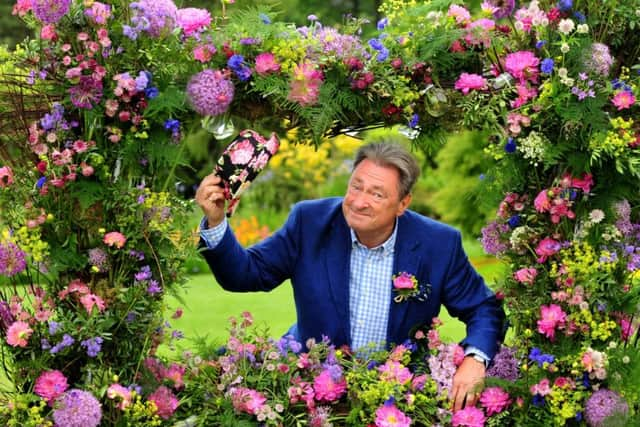Common sense tells us it’s a terrible idea to build on flood plains, says Yorkshire gardening guru Alan Titchmarsh


He points out the insects and birds that turn up to this haven for local wildlife. It’s hard to believe that it is now half a century since the young Alan (he’ll turn 71 come May) first made an impact on the viewing public.
Today, his Hampshire home is a long way from his roots in Ilkley. But can he recall the first garden that he could call his own?
Advertisement
Hide AdAdvertisement
Hide Ad“I certainly can,” he says with a broad grin. “It was 15 feet by 35, so it was relatively long, and rather thin, and it had the lot. And I mean the lot! Everything from a shed to a pond, from a rockery to a lawn and a vegetable patch. I just crammed it all in, and I loved it. Whatever the size of their garden, people like me just love their own particular space, and I’m forever telling people that everyone, no matter their circumstances, wherever they may live, can grow something. There’s always room for a window-box.”


This prompts a story about a lady who emailed him a while back. “She told me that she had nothing at all that was, or could be, green. She said: ‘All I’ve got is a set of steps outside the front door’. So I emailed back and said ‘What about pots? It doesn’t matter how big they are, surely you can manage a few?’ And I thought that was that until a month or so had gone by and I got another mail, and all it said was ‘I’ve got a bee!’
“That lovely soul had gone out, bought her pots and filled them with plants, and she’d just seen that nature was loving it. And we all know how much we need bees – we’d all starve and die without them. So she’d done her bit and she was suffused with pleasure. That’s lovely, isn’t it?”
Advertisement
Hide AdAdvertisement
Hide AdIt’s a great example of “starting something off, putting something back”. However, Alan gets annoyed with people who just dig up their gardens and put in paving blocks.
“Equally, I do actually wonder how many of those people we all saw on the recent Extinction Rebellion marches also had a wide expanse of concrete or Tarmac around their homes. If they were protesting, and they were guilty of that, it seems both disgraceful and more than a bit two-faced to me.”
However, he has sympathy for those who were caught up in the autumn floods. “I cannot even begin to think how dreadful it must have been for everyone concerned. My heart goes out to them all,” he says.
This brings him on to flood plains and why houses are built on them. “Don’t those words mean anything to anyone? Listen to me, I’ll say it again, ‘flood plain’. Does that tell you anything at all?” He grins ruefully: “There are reasons, for pity’s sake, why places are called Foggy Bottom or Runnymede. It’s because they are in a hollow where there’s damp, or because there’s a lot of water that collects on low-lying ground. It’s as simple as that. So why ignore those ancient warnings?”
Advertisement
Hide AdAdvertisement
Hide AdAlan Titchmarsh and his deep-rooted valuesSpeaking his mind, he agrees, has always been part of his psyche. “It’s probably a very Yorkshire thing,” he says.
Reminiscing a little, he recalls that his career is all down to one thing. “Greenfly”, he says. It was back in the summer of 1979 when an invasion of greenfly from the continent caused problems particularly in the south of England. As a young gardening expert, he was invited in to talk about it on the BBC’s Nationwide programme. “As I recall, my answers were very non-organic, and would have horrified anyone today.”
He was invited back and the rest, as they say, is history. He has travelled the world, had numerous TV series of his own and guest-starred on countless others. He’s been the “face” of the Chelsea Flower Show, written dozens of books, both fiction and instructional “how to” volumes, and has his own radio show on Classic FM.
For many years, he had his own afternoon TV chat show and then there was the gardening phenomenon that was Ground Force, which, back in the day, pulled in regular audiences of 12 million.
Advertisement
Hide AdAdvertisement
Hide AdAlan admits that the programme was, perhaps, slightly alien to his own horticultural sensibilities, in that he believes in creating a garden and watching it grow. “It happens so slowly, so imperceptibly that you really don’t notice it. But that tiny sapling that you planted way back when turns into a full tree, and there it is, with insects in the flowers and on the leaves, and birds nesting in it or settling on the branches, and you can say, with a wee bit of pride, ‘I’m the reason for that’.
“My heroes are people like Humphry Repton and Capability Brown, men who had the vision, centuries back, to see what a landscape would be like generations on. That is just incredible. Gardens that we make today are a legacy for our children, our grandchildren and beyond. I was so lucky that both my grandfathers were keen gardeners and allotment holders, and I went down with them when I was little more than a toddler.”
He enjoyed his time on Ground Force, even if it was very different. “It was instant, a makeover. But that was for a reason – we were helping people out, and often it was for a very good cause. And it seemed to hit the mood of the time. I left when I felt that it had run its course. Always leave ’em wanting more, and not when you become a bore. That’s my motto.”
Advertisement
Hide AdAdvertisement
Hide AdHe is, he says, constantly being asked to go on things like Strictly Come Dancing and I’m a Celebrity... Get Me Out of Here!, but has always refused. “I shall continue to do so. I say ‘no’ to the first because my dear wife Alison was a dancer and she tells me, quite emphatically, that my knees would pack in if I attempted to do lifts. And it’s no to the second because I do not want to be the ‘token old codger’, pulling wriggly things from my ears. Thanks, but no thanks!”
He remains a busy man. Next month he’s back in Ilkley for a sold out “Evening with” event. He also has the forthcoming publication of his first book of poetry, Marigolds, Myrtle and Moles. “Some of it’s quite playful, and funny, other verses are quite serious. I’m interested to find out how people take it”. And then he chuckles: “Move over, Pam Ayres...”
If he had to offer a piece of advice to any budding gardener he reckons that it would be to “have patience... realise that you will make mistakes, and learn from them. One of my first lessons was trying to grow carrots in a flinty soil, without a raised bed. They came out as gnarled monstrosities. The next year I didn’t make the same mistake.”
He’s delighted that his two grandsons (Hugo, seven, and Zackary, five) have started to take an interest in growing things. “Will they take over from Grandpa? Too early to tell. But oh, wouldn’t that be lovely?”